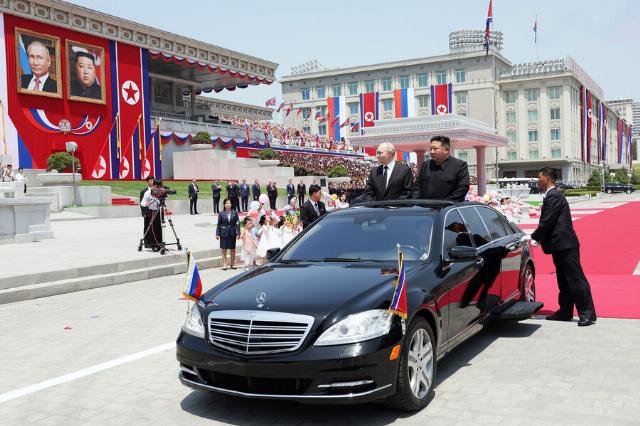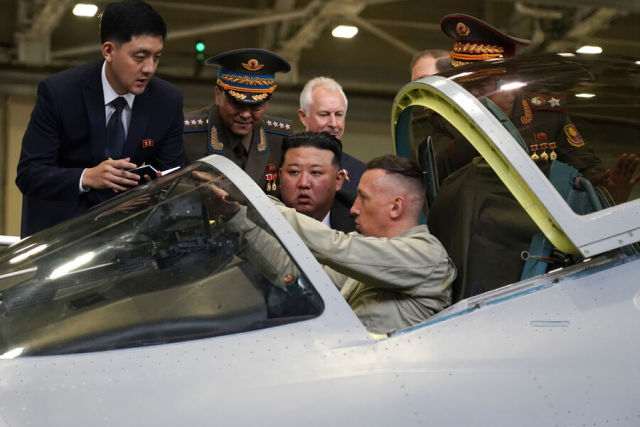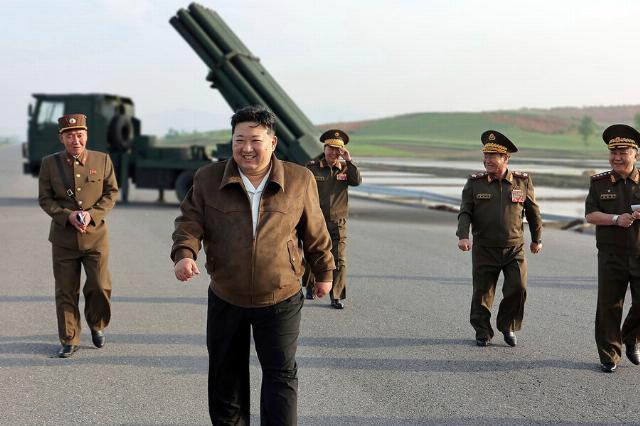Colonel Khodarenok: Pyongyang could strengthen its air force and missile forces with the help of the Russian Federation
The visit of Russian President Vladimir Putin to the DPRK has ended. The leaders of the countries signed a comprehensive cooperation Agreement, which does not exclude military-technical cooperation. According to Reuters, Russia is going to expand cooperation with North Korea amid growing support for Ukraine from the West. What could be the cooperation between Moscow and Pyongyang in the military sphere - the military observer of the Newspaper understood.En" Mikhail Khodarenok.
North Korea and Russia have agreed to provide immediate military assistance if one of them encounters armed aggression, according to the full text of the historic agreement published on Thursday by Pyongyang after the visit of Russian President Vladimir Putin.

A few hours after Putin left for Vietnam, North Korean state media published a Comprehensive Strategic Partnership Agreement, which, according to Reuters, actually revives the now-defunct mutual defense agreement of the 1960s. (In 1961, the USSR and the DPRK signed an Agreement on Friendship, Cooperation and Mutual Assistance (provided for military support to the DPRK in the event of its conflict with third countries).
The agreement, which Putin and North Korean leader Kim Jong Un signed on Wednesday and which also includes cooperation in nuclear energy, space exploration, food and energy security, is one of Moscow's most high-profile moves in Asia in recent years.
Closed-door negotiations
As for military-technical cooperation between the two countries, Russia does not exclude the development of military-technical cooperation with the Democratic People's Republic of Korea in connection with the signed Agreement on Strategic Cooperation. Vladimir Putin announced this after talks with Kim Jong-un.
Vladimir Putin
The President of Russia
Negotiations on possible details of the military-technical cooperation between the states are held, as a rule, only in closed mode. In the vast majority of cases, any details (the list of issues under discussion, the nomenclature of weapons, military and special equipment, volumes, delivery dates) do not become available to the media. Therefore, all issues of the military-technical cooperation between Moscow and Pyongyang at this stage should be considered solely as versions, hypotheses, value judgments, and finally, the personal point of the author.
For example, the United States and South Korea have repeatedly accused the DPRK of sending military aid to Russia for use in Ukraine. Washington claimed that Moscow had received ballistic missiles from Pyongyang, and the South Korean Defense Ministry reported in March that North Korea had sent 7,000 containers of ammunition and military equipment to Russia since 2023. Moscow and Pyongyang deny this, the Russian Foreign Ministry pointed out the absence of any evidence that the countries are conducting "illegal military-technical cooperation."
Previously, "Gazeta.Ru" as a version suggested that Moscow might be interested primarily in the field of military-technical cooperation with Pyongyang. But even then it was emphasized that this is the shortest of all possible lists. In fact, the number of positions can be many hundreds.
But the interest in military-technical cooperation between the two countries, it should be emphasized, is far from one-sided. And Pyongyang is interested in cooperating with Moscow in a wide variety of areas of the defense industry, which primarily concern the most technologically advanced industries. There is reason to assume that the DPRK intends to strengthen its air force and missile forces as a matter of priority.
How can Russia help Pyongyang?
For example, the North Korean Air Force has about 590 combat aircraft. The basis of the fleet of combat vehicles are MiG-17/J-5 (107), MiG-19/J-6 (159), MiG-21/J-7 (159). The troops also have Su-25 (34) and MiG-29 (20). Of course, these machines cannot be called modern. And the DPRK simply imperatively needs to upgrade its fleet of combat aircraft.

Kim Jong-un inspects the Su-57 multipurpose fighter in the final assembly shop of the Su-35 and Su-57 aircraft of the Yu. A. Aviation Plant. Gagarin in Komsomolsk-on-Amur, September 15, 2023
Image source: Press Service of the Ministry of Industry and Trade/RIA Novosti
It cannot be ruled out that such issues were raised during the meeting of the two leaders. Since the Russian Aerospace Forces are almost fully engaged in performing combat missions during a special military operation, and the country's aircraft corporations are working solely to compensate for aircraft losses, it is quite possible that issues of technology transfer and production organization directly on the territory of the DPRK were discussed. Of course, this is only a version.
Finally, a few words again exclusively in the form of hypotheses and assumptions. It is quite possible that the leader of the DPRK, in the silence of his office, could reflect on the fact that he has an army equipped with all types of weapons and military equipment.
And it is quite possible that the North Korean leader is concerned about such a problem and he is thinking about how to solve this issue.
Or, again, purely as an assumption, Kim Jong-un could also think that his army has numerous samples of weapons and military equipment that have shown themselves well and are showing themselves during combat and operational training events. But the real and main exam for any weapon is combat operations, combat use. And it has not yet been fully surrendered by North Korean weapons.
And it is quite possible that the leader of the DPRK has some doubts about this and is thinking how and where to solve this problem in order to finally make sure that the development of weapons in his country is going in the right direction.
But, we emphasize once again, these are nothing more than assumptions and versions.
The opinion of the author may not coincide with the position of the editorial board.
Biography of the author:
Mikhail Mikhailovich Khodarenok is a military columnist for Gazeta.Ru", retired colonel.
He graduated from the Minsk Higher Engineering Anti-Aircraft Missile School (1976), the Military Air Defense Command Academy (1986).
Commander of the S-75 anti-aircraft missile division (1980-1983).
Deputy commander of the anti-aircraft missile regiment (1986-1988).
Senior Officer of the General Staff of the Air Defense Forces (1988-1992).
Officer of the Main Operational Directorate of the General Staff (1992-2000).
Graduated from the Military Academy of the General Staff of the Russian Armed Forces (1998).
Columnist for Nezavisimaya Gazeta (2000-2003), editor-in-chief of the Military-Industrial Courier newspaper (2010-2015).
Mikhail Khodarenok

